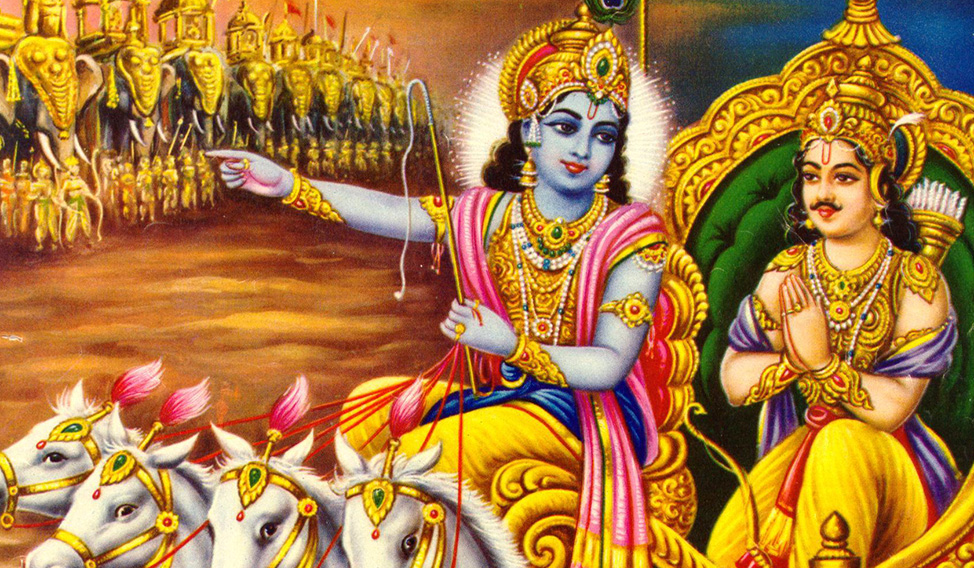zlOka 13
- Published in Barbara Gambin
- Written by mrw
- Permalink

vedadev.ru 02-13 ALU 02 13
The same way the soul in this body goes thru childhood, youth and old age…
(13a) dEhinO ‘smin yathA dEhE kaumAraM yauvanaM jarA
06.24.13 a देहिनो ऽस्मिन्यथा देहे कौमारं यौवनं जरा
yathA यथा → the same way as
asmin अस्मिन्, dEhE देहे → 7 in this, 7 in body
dEhinaH देहिनः → 6 the soul has (the soul experiences)
kaumAraM कौमारं, yauvanaM यौवनं, jarA जरा → 1 childhood, 1 youth, 1 old age
…in that same way it goes from a body to another. A steadfast person is not confused in this matter.
(13c) tathA dEhAntara-prAptir dhIras tatra na muhyati
06.24.13 c तथा देहान्तरप्राप्तिर्धीरस्तत्र न मुह्यति
tathA तथा → in that same way / like that
dEha- देह + antara- अन्तर + prAptiH प्राप्तिः → body- + another one- + 1 the getting — the getting of another body (works).
dhIras धीरस्, tatra तत्र, na न, muhyati मुह्यति → 1 steadfast one, in it, not, V is confused
tatra तत्र means the same thing as 7 tasmin तस्मिन् — “in it”, “in this”.
The word antaraM अन्तरं can mean “a different one”, “another one”, “a change of”, “a replacement of”. So dEhAntaraM देहान्तरं “a change of body” may mean “another body” (same as anya-dEhaH अन्यदेहः and anyO अन्यो dEhaH देहः).
So kRSNa कृष्ण is telling arjuna अर्जुन that the fact he has doubts about killing relatives show that he is fickle and does not really trust the old teachings about heaven and hell.
The touches of matter, arjuna अर्जुन, give cold, heat, pleasure and pain…
(14) mAtrA-sparzAs tu kauntEya zItOSNa-sukha-duHkhadAH
06.24.14 a मात्रास्पर्शास्तु कौन्तेय शीतोष्णसुखदुःखदाः
mAtrA-sparzAH मात्रास्पर्शाः → 1 the touches of matter
kauntEya कौन्तेय → 8 arjuna अर्जुन — o son of kuntI कुन्ती
zIta- शीत + uSNa- उष्ण + sukha- सुख + duHkha- दुःख + dAH दाः → cold- + heat- + pleasure- + pain- + 1pl givers
tu तु is sometimes added when changing subject.
…they are always coming and going, and are impermanent. Endure them!
AgamApAyinO ‘nityAs tAMs titikSasva bhArata
06.24.14 c आगमापायिनो ऽनित्यास्तांस्तितिक्षस्व भारत
AgamApAyinaH आगमापायिनः → 1pl (they are) coming and going / transitory
This word AgamApAyin- आगमापायिन् is built from AgamaH आगमः “act of coming” + apAyaH अपायः “act of going away” + suffix -in- इन् ‘which has’.
a-nityAH अनित्याः → 1pl (they are) impermanent — they don’t last forever
tAn तान् + titikSasva तितिक्षस्व → 2 them + V endure!
bhArata भारत → 8 arjuna अर्जुन — o descendant of bharata भरत
The man these don’t affect…
(15a) yaM hi na vyathayanty EtE puruSaM puruSarSabha
06.24.15 a यं हि न व्यथयन्त्येते पुरुषं पुरुषर्षभ
yam यम् + puruSam पुरुषम् → 2 the one whom + 2 man — the man whom — anyone whom
na न + vyathayanti व्यथयन्ति + EtE एते → not + V they agitate + 1pl these — …these don’t agitate
puruSa-rSabha पुरुषर्षभ → 8 o man-bull
…who is the same in pain and pleasure, who is steadfast, he is fit for inmortality.
(15c) sama-duHkha-sukhaM dhIraM sO ‘mRtatvAya kalpatE
06.24.15 c समदुःखसुखं धीरं सो ऽमृतत्वाय कल्पते
sama-duHkha-sukham समदुःखसुखम् → 2 (who is) same in pleasure and pain
dhIram धीरम् → 2 (who is) steadfast
saH सः + amRtatvAya अमृतत्वाय + kalpatE कल्पते → 1 he + 4 for inmortality + V is fit
What is unreal never comes to be, and what is real never stops being;
(16a) nAsatO vidyatE bhAvO nAbhAvO vidyatE sataH
06.24.16 a नासतो विद्यते भावो नाभावो विद्यते सतः
na न + asataH असतः + vidyatE विद्यते + bhAvaH भावः → not + 6 of the unreal + V there is + 1 appearing
na न + abhAvaH अभावः + vidyatE विद्यते + sataH सतः → not + 1 disappearance + V there is + 6 of the real
those who see reality can tell these two apart.
(16c) ubhayOr api dRSTO ‘ntas tv anayOs tattva-darzibhiH
06.24.16 c उभयोरपि दृष्टो ऽन्तस्त्वनयोस्तत्त्वदर्शिभिः
ubhayOH उभयोः → 67 of both
anayOH अनयोः → 67 of these
dRSTaH दृष्टः + antaH अन्तः → 1 is seen + 1 the edge (the limit between both)
tattva- तत्त्व, darzibhiH दर्शिभिः → reality-, 3pl by seers
darzin- दर्शिन् means ‘one who sees’, root dRz दृश्. Not same as RSi- ऋषि “seer, prophet, holy man”.